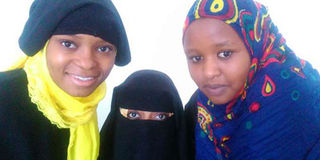Court of Appeal allows wearing of hijab in schools

Technical University of Mombasa students before the World Hijab Day on January 20, 2016. Muslim female students may now go to school with hijabs as part of the school uniform, the Court of Appeal ruled on September 8, 2016. PHOTO | WINNIE ATIENO | NATION MEDIA GROUP
What you need to know:
- In a ruling delivered by Justices Phillip Waki, Roselyne Nambuye and Patrick Kiage, the judges directed that the Education Cabinet Secretary should ensure new rules on school uniform are made and should not discriminate students based on their religion.
- The verdict was certainly good news to some students of a Church sponsored school in Isiolo which has had a yearlong battle in the corridors of justice seeking freedom to be allowed to wear hijabs and white trousers while attending classes as part of their Islamic religious tradition.
Muslim female students may now go to school with hijabs as part of the school uniform, the Court of Appeal has ruled.
In a ruling delivered by Justices Phillip Waki, Roselyne Nambuye and Patrick Kiage, the judges directed that the Education Cabinet Secretary should ensure new rules on school uniform are made and should not discriminate students based on their religion.
“The education CS should consider formulating and putting into place regulations, after due consultations, for the better protection of the fundamental right to freedom of religion and belief as well as equality and discrimination for all pupils and students in Kenya’s education system,” the judges ruled.
The verdict was certainly good news to some students of a Church sponsored school in Isiolo which has had a yearlong battle in the corridors of justice seeking freedom to be allowed to wear hijabs and white trousers while attending classes as part of their Islamic religious tradition.
The judges also ordered that the School’s board of Management should hold talks with its stakeholders particularly the parents and students with a view of amending relevant rules touching on school uniform.
They directed that the discussion should see to it that the new rules provide an exemption as well as accommodate those students whose religious beliefs require them to wear particular items of clothing in addition to the school uniform.
The verdict, consequently overturned that of the High Court, which was delivered by Justice Harun Makau on May 7, 2015.
Justice Makau had ruled that the Teachers Service Commission’s decision and the Isiolo County education office allowing female students of the said school to wear hijabs while attending classes was illegal and discriminatory.
He had however faulted the decision as being contrary to school regulations and issued an order stopping TSC, County Education director as well as the Sub County’s education officer from allowing students to wear hijab and interfering with the running of that school.
He had further ordered that the three should not effect the Hijab wearing rule.
Dissatisfied with the verdict, the trustees of the Methodist Church, which sponsors the Mixed Day Secondary School and was strongly opposed to wearing hijabs and trousers from the onset, took the matter to the Appellate Court.
According to the church, the dispute arose when the county’s education officer, in his speech during a prize giving day, said that female students wear hijab and white trousers, a directive which they claimed had created disparity among students.
The church claimed that thereafter Muslim girls in the school became relaxed with the required uniform and instead started wearing open shoes to school.
When the students were questioned, they claimed that they were being discriminated on because of their faith whilst the Christian ones allegedly felt their counterparts were being given preferential treatment by the institution.
“The order that the school uniform policy indirectly discriminates against female Muslim students is set aside and substituted with one which says that it so far prevents them from manifesting their religion through the practice and observance of wearing the hijab,” the judges said.





